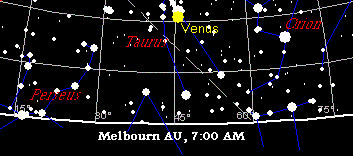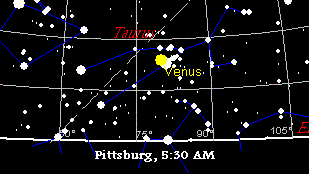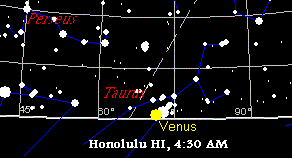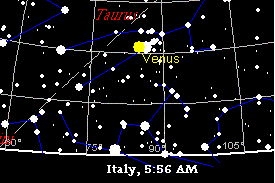
| |
 |
I´m currently in Melbourne, Australia. When I woke up at 7AM and stepped outside the Sun was still about 30 - 45 minutes away from rising. There´s an amazingly bright object about ENE, approx 30 degrees vertical.
Note: at 7:00 AM, non-daylight saving time as the Souther Hemisphere is in Winter, Venus should be 20° above the horizon, thus rising too EARLY.

But according to the applet, for the Washington State [Jul 4] view, it should have been at 24° inclination. This bright object was 35° , easy from the horizon, once again too high per the applets.
For Washington State on July 4, rising EARLY, thus not transiting as anticipated.
I am in Western Pennsylvania and have been watching this object in the morning sky for about a week now. It appears around 5:30 AM in a SE position.
For Pittsburg PA on July 4, rising EARLY, as well up by only 15° by 5:30 AM in hilly country, per Skymap should be due East at that time but is noted as
SE so further along on the Ecliptic, EARLY.

Here are a series of 5 pictures this morning taken from the live cam at the Haelakala Crater. Finally, the object starts to fade at 5:25. From this location it is visible for 2 hours prior to sunrise!
For Honolulu HI on July 8, Venus should even be on the horizon until 4:30 AM daylight saving time (earliest possible time), yet it is visible at 3:30 AM in
these photos, well above the horizon, EARLY.

I'm sending a shot at this bright object - Venus - taken on Jul. 8th 2004 at 05:36 AM here in Italy. We are on DST and Sun rises just a little bit on the left of the only tall building you see in the image.
Per Skymap, at 5:36 (daylight saving time), Venus should be about 22° up and dead East. This photo shows Venus rising too EARLY.

The unusually Large and Bright Planet Venus is visible near the time of 5-6 AM at an extremely high arc well above the horizon. Jupiter is also visible in the evening sky directly to the West at an extremely high arc with considerable brightness. Neither Jupiter or Venus appear to be in their normal locations and are appearing too far above the horizon. This photo was taken on July 14 from the Eastern Sky at 5:30 AM here in Baton Rouge. As you can see the planet is far above the horizon, and unusually bright and close in appearance.